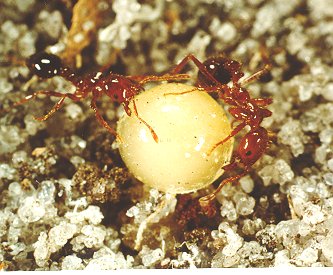This page has been archived and is being provided for reference purposes only. The page is no longer being updated, and therefore, links on the page may be invalid.
New Capsules: “Kiss of Death” or “Breath of Life” for Insects
By Tara Weaver-Missick
March 9, 1999
Agricultural Research Service scientists have joined forces with a private company to develop new high-tech packaging for beneficial insect meals. Once reared on a nutritious artificial diet, these environmentally friendly, good-guy insects can be released to attack pests, such as crop-destroying caterpillars.
The new packaging, designed as a small capsule (2-5 mm diameter), provides a unique way for serving food or other agents to insects. The capsules hold either aqueous or oily materials--a key advantage over other gelatine or food-based capsules that can only hold non-watery materials.
ARS scientists are working with researchers at Analytical Research Systems, Inc., Gainesville, Fla., to develop the biodegradable packs. ARS is the U.S. Department of Agriculture’s chief scientific agency.
Research entomologist Patrick D. Greany and other scientists at ARS’ Center for Medical, Agricultural and Veterinary Entomology (CMAVE) in Gainesville, Fla., are studying the capsules in-depth to confirm that they appeal to a variety of both beneficial and pest insects. The food in the capsules will be used instead of natural prey to reduce costs of mass rearing insect predators for biological control use. In addition, these inexpensive capsules might be used as food supplements in the field to maintain beneficial insect populations when there’s a shortage of prey.
The capsules also provide a novel delivery system for microbial pest control agents such as protozoa, bacteria and viruses. Tests with fire ants by ARS research entomologist David F. Williams (CMAVE) showed that foraging workers readily take the capsules into their nests, where the ants open the package and devour the contents.
A grant from USDA’s Small Business Innovation Research Program and a Cooperative Research and Development Agreement are supporting this research between Analytical Research Systems, Inc., and ARS.
Scientific contact: Patrick D. Greany, ARS Center for Medical, Agricultural and Veterinary Entomology, Gainesville, Fla., phone (352) 374-5763, fax (352) 374-5781, pgreany@gainesville.usda.ufl.edu.


